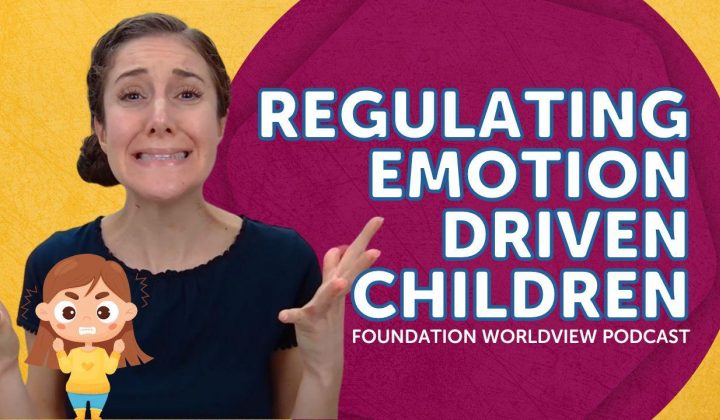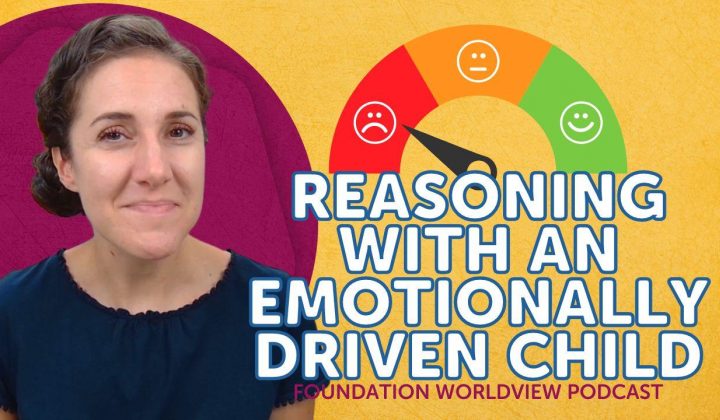Learn more about the journey that led to us equipping kids to carefully evaluate every idea they encounter.
Meet members of our team who have contributed to curriculum development.
Hear from real users of the Foundation Curriculum.
Learn what we believe about God, Jesus, Scripture, and more.
What Does the Bible Say About Disciplining Your Children?
Join host Elizabeth Urbanowicz on the Foundation Worldview Podcast as she delves into the biblical principles of disciplining children. Using various passages of Scripture, she explains the importance of discipline rooted in love and highlights how it reflects our relationship with God.
Transcript
Note: The following is an auto-transcript of the podcast recording.
Hello friends, and welcome to another episode of the Foundation Worldview Podcast where we seek to answer your questions so that you can equip the children that God has placed in your care to carefully evaluate every idea they encounter and understand the truth of the biblical worldview. I'm your host, Elizabeth Urbanowicz, and I'm thrilled that you joined me for another episode today. Today's question asks, "what does the Bible say about disciplining children?" And while that is a short question, it's a very broad one. What does the entirety of Scripture say about disciplining children? So that's what we're going to dive down deep into today.
But before we do that, if you have a question that you would like me to answer on a future Foundation Worldview Podcast, you can submit that question by going to FoundationWorldview.com/podcast. Also, I would ask that if you found the content of this podcast to be beneficial, that you would consider liking and subscribing to make sure that you never miss any future episodes, and also ask that you would consider writing a review and sharing this content with those within your sphere of influence so that we can equip as many Christian adults as possible to get the kids in our care to think critically through the truth of the biblical worldview.
Now, as we think about what the Bible has to say about disciplining children, this is an important question because we want to make sure that our discipline of our children, that every part of our parenting, of our instructing of our children is rooted in Scripture. So we're going to do two different things in this podcast. Neither of these things will be exhaustive because we work really hard to keep this podcast under 20 minutes, but hopefully it will be just a good initial foundation. The first thing we're going to do is look at specific passages that talk about parenting, and then we're going to take a step back and look at some overarching biblical principles.
So first, I've pulled out a good majority of the passages in Scripture that talk about disciplining children, and I'm going to be reading them for us and going through them in chronological order. So the order in which they appear in the Christian Bible.
The first passage is Proverbs 3, verses 11 and 12, which says, "My son do not despise the Lord's discipline or be weary of his reproof. For the Lord reproves him whom he loves as a father, the son in whom he delights." So some basic principles that we can glean from this basic truths that we can glean from this passage is that God disciplines us as his children, and he disciplines us because he loves us. This verse parallels it to a father who delights in his son, that a father who delights in his son is going to discipline him.
And when we think about it, this makes sense because the word discipline, the root of it is disciple. So we are training our children to be disciples of who of Jesus, and we're doing this because we love them. So discipline will be done out of love.
The next passage is Proverbs 19, verse 18, which says, "discipline your son for there is hope. Do not set your heart on putting him to death." Now, at first, this verse may seem a little bit strange, but when we look at it, the first couplet says, discipline your son for there is hope. So discipline leads to hope. And then the second part says, do not set your heart on putting him to death, not saying that a father or mother is going to purposely put their son to death, but without discipline a child will have their sin nature unrestrained. And Scripture is clear in Romans 8, that the mind that is set on the flesh leads to death. Sin always leads to death. So if we do not discipline our child, if we just let their sin go out of control, ultimately that is leading to their death, to their destruction. So discipline is important for correcting our child and saving them from destruction.
Next, Proverbs 22, verse 15 says, "Folly is bound up in the heart of a child, but the rod of discipline drives it far from him." So first, from this passage, we learn that children naturally are born with folly in their hearts. The children are going to do foolish things, which is just the opposite of everything our culture is currently saying. Our culture is currently saying that whatever a child feels, that needs to be affirmed and validated and celebrated because that's who the child really is. If there's a male child who claims that he is a female that needs to be affirmed and validated and separated because only he knows who he really is, that he's a female. If a little girl thinks she's a cat, she's a furry, that needs to be affirmed and acknowledged and validated and celebrated because that's who she truly is, where that's just the opposite of what the Scripture is saying, that naturally there's folly in our hearts and the rod of discipline drives it from us.
Now, the word rod can be misunderstood Here. You know that the rod was an instrument of correction. It was not an instrument of abuse. When rods were used with shepherds, they were used to keep away the wolves and the bears and the lions, and also to correct the sheep, not to beat the sheep, but to keep the sheep on the right path, to keep them from getting tangled in thorn bushes, to keep them from falling down a ravine, to keep them from the path where they were going to encounter a predator. So the rod discipline correction of our children drives this folly from them.
The next passage, Proverbs 23, 13 and 14, excuse me, that's not part of the verse. It says, "do not withhold discipline from a child. If you strike him with a rod, he will not die. If you strike him with the rod, you will save his soul from Sheol." Again, we need to remember that that rod is the instrument of correction. It's not an instrument of abuse. And so children need discipline. They need to be corrected so that their soul is saved from death. When we're working with three-year-olds, this is very practical in some ways. We need to correct the child who is putting his hand out towards the stove. We need to correct the child, we need to pull her back from the street, who is running into traffic. That discipline saves our children from destruction, and please don't misunderstand me. Discipline does not save our children as in ultimately reconciled them to God. Only Jesus through his life, death and resurrection can do that. But discipline saves our child from destruction, from being taken over by their sin nature.
Proverbs 29 verses 15 and 17, say, "the rod and reproof give wisdom, but a child left to himself brings shame to his mother. Discipline your son and he will give you rest. He will give delight to your heart." So the rod, this instrument of correction and reproof, they lead to wisdom, okay? They don't lead to discouragement. They don't lead to a beating. They lead to giving our children wisdom, where when a child is left to his own devices, he brings shame because our sin naturally leads us astray.
Now, moving on to the New Testament, two specific passages of Scripture that talk about discipline with children. Ephesians chapter 6, verse 4 says, "fathers do not provoke your children to anger, but bring them up in the discipline and instruction of the Lord." So here, it's a comparison of what parents should do and should not do that parents are to bring their children up under the discipline and instruction of the Lord, to learn to love and trust and obey Jesus in his commands, but they're not to provoke their children to anger that we're not just to discipline our children out of our own anger. We're not to frustrate them, to discourage them, we're to correct them so that they can see God's goodness and learn to be a disciple of Jesus.
Similarly, Colossians chapter 3, verse 21 says, "fathers do not provoke your children, lest they become discouraged." So again, this command to fathers in particular, not to provoke their children so that they will not become discouraged, that the point of discipline is not to discourage a child, that some parents discipline their children in a way that's very demeaning and belittling and discouraging them, and they're trying to just shame them out of this bad behavior. But that's not what discipline is. Discipline is showing the child why their behavior is wrong and encouraging them in the Lord to love the things of God.
So those are some main passages that talk about disciplining children. And you'll notice there weren't too many of them because the Bible is not primarily an instruction manual into how to discipline children. Primarily the Bible is the overarching story of God's plan of redemption for his people. And so what I think is even more important is looking for overarching principles we can glean from this grand story and how they apply to disciplining children.
So first, from Genesis 1, the first chapter of Scripture, we learn that children, all humans are image bearers of the holy God. And we must treat children as such that when we are disciplining children, we must remember that they bear the image of the holy God. And how we treat them is how we are treating Jesus. So when we discipline them, it should not be out of anger. It should not be merely because we want things to run smoothly in our house. It should not be because they are annoying us. It should be because we love them and we want what is best for them.
Now, there's going to be times where we don't discipline them in that way. We're going to discipline them out of anger, and we're going to need to then go and confess and repent of our sin before them. We need to make sure that we are treating our children as image bearers in situations of discipline.
Another overarching principle that we learned from Genesis 3, and then also Romans 3, is that children are fallen. They're sinful just as we are, that in Adam all die and all have sinned and fall short of the glory of God. And so that means that discipline, daily discipline is going to be necessary, not that we're looking for opportunities to punish our children, but we just have to have the expectation that there's not going to be a single day that goes by when our children don't sin against us and against God.
And so we need to have that expectation that there is going to need to be consistent discipline and correction in our homes because our children are fallen just as we are. And that's something that we need to remember too, that when we sin against our children, we need to discipline. We need to be discipled to be made more like Jesus. And so we need to go and confess and repent of that sin before our children and reconcile that relationship.
Another overarching principle that I think is really important for us to have at the forefront of our minds is that the parent child relationship is a visible picture of our relationship with God. This is made clear in the 12th chapter of Hebrews starting in verse 4 of Hebrews chapter 12. The writer writes "In your struggle against sin, you have not yet resisted to the point of shedding your blood and have you forgotten the exhortation that addresses you as sons? 'My son, do not regard lightly the discipline of the Lord nor be weary when reproved by him. For the Lord disciplines the one he loves, and chastises every son whom he receives.' It is for discipline that you have to endure. God is treating you as sons. For what son is there whom his father does not discipline? If you are left without discipline, in which all have participated, then you are illegitimate children and not sons. Besides this, we have had earthly fathers who disciplined us and we respected them. Shall we not much more be subject to the Father of spirits and live? For they disciplined us for a short time as it seemed best to them, but he disciplines us for our good, that we may share His holiness. For the moment, all discipline seems painful rather than pleasant, but later it yields the peaceful fruit of righteousness to those who have been trained by it."
So in this passage, the author is comparing God disciplining us to a parent disciplining a child that this parent child relationship is meant to point to ultimate reality to our relationship with God. And so we need to remember this in moments when we're tempted to be lazy and just think, "oh, I know I said that if they did this, they were going to get this punishment. But you know what? I'm just too tired to do that right now," that we need to consistently point our children back to this, that God doesn't respond in that way, that God faithfully disciplines us, that the Holy Spirit faithfully can convicts us of sin and conforms us more into the image and likeness of Jesus.
So we need to remember that our discipline of our children, it is playing out in a much larger story that we are showing our children a picture of who God is, that God disciplines us out of love. And so I think we need to really bear all of these things in mind that I've just mentioned, that our children are image bearers, that they're fallen, and that this parent-child relationship is meant to reflect the ultimate relationship between us and God the Father. And we need to keep these things in mind as we are disciplining our children.
Now, this is going to play out different in different families because all children are different. Even within the same family, there's some children who might need a more severe consequence for their action before they actually realize that it was wrong, where another child might just need to be looked at in a way that shows them what you did was wrong, and then they realize what they did was wrong, and they have a huge sense of guilt for that. So discipline is going to look different with different children. But I think if we can keep those overarching pictures or principles in mind, that will really guide us as we're disciplining our children.
Also, just as further resources, again, this is a short podcast, so this is not going to answer all of your questions about biblical discipline, but a few other resources that I've recommended before on this podcast, check out Visionary Family Ministries, which is run by Dr. Rob and Amy Rienow. They have a podcast. They have a bunch of books that all talk about biblically raising children and disciplining children. Also, the parenting series put out by Paul David Tripp called Getting to the Heart of Parenting. That's another one that talks about parenting and disciplining through the lens of the gospel. So those are great follow-up resources to look to.
Well, that's a wrap for today's episode. But as always, as we leave this time together, my prayer for you is that no matter the situation in which you and the children in your care, find yourself that you would trust that God is working all things together for your good by using all things to conform you more into the image of His Son. I'll see you next time.
Related Posts and insights

Regulating Emotion Driven Children
Today's question says, "When raising emotional kids, how do you teach your children how to not only recognize their emotions, but practically manage them in a biblical way, upholding the biblical virtue of self-control?"

Reasoning with an Emotionally Driven Child
In this episode, Elizabeth Urbanowicz explores how to reason for the faith with a child who tends to be driven by their emotions or feelings. We'll look at helping them understand the concept of truth, how to discern it, and ultimately checking if their emotions or feelings towards something aligns with what is true.

Teaching Our Kids About Using Emotions and Discernment
Our children will repeatedly encounter this idea that their feelings are the most reliable guide for truth. How can we equip them to rightly recognize their emotions, without being led by them? Here are a couple of ways we can intentionally prepare our children to make decisions based on discernment rather than pure emotion.





